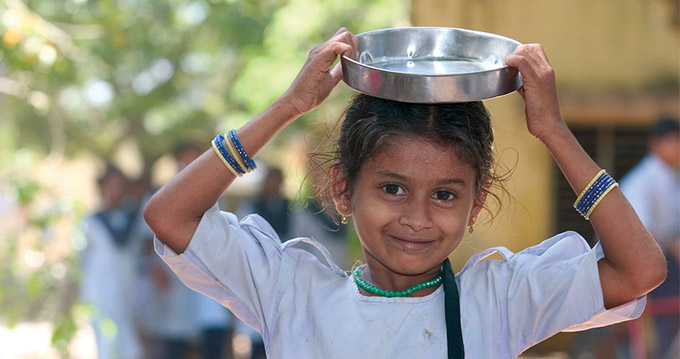|
|

|
|
|
|
Letter From The President
|
|
|
Lent is a time of preparation. We try, through spiritual discipline, to ready ourselves for the death and
resurrection of Jesus. For some of us that includes giving up a treasured treat. For others it is about
taking on a special new activity or ministry. For others of us it includes deepening our prayer life. All of
these are important ways to prepare ourselves for the new life that we will enjoy at Easter time.
Episcopal Relief & Development's work is a lot like Lent. We are constantly preparing for rebirth and a
better future. That takes planning and it takes thought. What actions can we take today that will make
things better tomorrow? How do we transform tragedy into hope?
Between June and October 2017 Episcopal Relief & Development responded to over 17 disasters in the
United States and around the world. The human suffering that we all witnessed was unprecedented. At
home, we were all shocked and saddened by the devastation wrought by hurricanes and fires.
Yet long before the disasters were in our newsfeeds, Episcopal Relief & Development had been
preparing for them. We had trained and equipped our diocesan partners in how to organize ministries
in the aftermath of tragedy. We had ensured that they would have the resources to respond as soon
as they were able. And in places such as Puerto Rico where communication systems were entirely
decimated, we provided our partners with satellite phones that enabled them to coordinate urgently
needed aid. We had gone through a time of preparation, just like Lent, to ensure that after the tragedy
of the disaster, our partners were ready to bring new life to their communities.
The same principle applies to our long-term development work. It takes time and planning to make
the smart strategic investments with our partners that in turn lead to better, life-giving, and
sustainable outcomes.
The work we do with children to meet their health and developmental needs is a prime example of
this. If we can ensure proper prenatal, postnatal, medical, nutritional, and developmental care for
children in their first six years, their long-term prospects not only for health but a lifetime of economic
prosperity are increased dramatically. Moreover, if we miss those years and a child falls behind essential
health and developmental benchmarks they can never catch up. Those years are lost forever and the
child will never realize their full God-given potential. I can imagine no greater sin.
It's sometimes frustrating not to see immediate results from the work that we do. But like Lent, it's
about the long game. How can we help communities plan for disasters? How do we help families
support their children in a way that will ensure a life lived to its full potential? How do we bring
new life?
Your faithfulness makes it possible to endure Lent and ensure the rebirth we celebrate on Easter
Sunday. Thank you.
|
|
|

|
|
With best wishes for a joyful Easter season,
|

|
Robert W. Radtke
President & CEO
Episcopal Relief & Development
|
|
|
|
|
|
|
|
|
|
PROGRAM FOCUS: Responding to an Unprecedented Season of Disaster
|
|
Last year's Atlantic hurricane season proved
exceptionally destructive, with three Category 4
hurricanes making landfall in the United States:
Harvey, Irma, and Maria. The loss of life and
property damage made these disasters catastrophic
by any measure.
Episcopal Relief & Development's US Disaster Program
equips Episcopal dioceses throughout the United States
to prepare for and respond to disasters like these.
With our partners, we provide emergency assistance
and help with long-term recovery, staying active in
communities after the TV cameras and many other aid
agencies have left.
TEXAS
Hurricane Harvey was the most powerful storm to
hit Texas in more than 50 years, bringing punishing
rains and unprecedented flooding to the state. But
before Harvey was even on the radar, Episcopal Relief
& Development had provided disaster preparedness
training and resources for volunteer leaders in
Episcopal Dioceses of Texas and West Texas, giving
them tools and resources they would need to respond
quickly and ably.
In the storm’s aftermath, dioceses around the state
began extensive relief and recovery efforts, and
seven months later, they’re still hard at work. In the
sprawling greater Houston area Episcopal Churches
and Episcopal Relief & Development partners are
working every day to get people like Norma back on
their feet.
Norma, a single mother who supports her family on
a fast food worker's wage, saw her house lose its roof,
floors, and several feet of walls. "I worked very hard to
provide the necessities of life," she said. "We lost all
of it."
But women and men from MOSAIC, the outreach
arm of St. Andrew's Church in nearby Pearland, are
helping her get back some of what was lost. They're
pounding nails and putting up sheetrock to rebuild
Norma's house.
"The children lost all the belongings, and their
toys," Norma said. "But now the kids are happy
because it is starting to come together and I'm happy.
Very thankful."
FLORIDA
Less than two weeks after Harvey, Hurricane Irma,
a ferocious 400-mile-wide storm, raged up the
Caribbean, and crashed down on Florida, turning the
streets of Miami and other cities into rivers. Episcopal
Relief & Development's focus in Florida has been both
on immediate relief and long-term rebuilding.
In Southeast Florida we worked with the Episcopal
Diocese to provide critical assistance to those who were
hardest hit: migrant workers, seniors, children, and the
homeless, who already lacked a roof over their heads.
As part of the long-term recovery plans, the diocese
has provided temporary trailers for those whose homes
were damaged or destroyed. The diocese is planning
to hire a part-time recovery coordinator to manage
ongoing response efforts in the months ahead.
A bit north in Central Florida, our team provided
emergency support, helping the diocese coordinate its
initial relief efforts there, delivering food and water,
bedding, and personal hygiene necessities. Because
church partners are deeply embedded in these
communities, they were able to identify and serve
those in the greatest need.
THE VIRGIN ISLANDS AND PUERTO RICO
And Mother Nature wasn't finished yet. Two weeks
after Irma, Hurricane Maria unleashed its
destructive force on Puerto Rico and the Virgin
Islands, parts of which had already been pummeled
by Hurricane Irma.
In advance of Maria, Episcopal Relief & Development
sent emergency support, partnering with the
Episcopal Dioceses of the Virgin Islands and of
Puerto Rico as well as with Convoy of Hope. In the
immediate aftermath, we were able to work with these
partners to distribute critical supplies, ensuring that
necessary items were shared with vulnerable families,
especially those in isolated communities.
In Puerto Rico, the emergency support we were
able to send helped the Episcopal Diocese of Puerto
Rico provide food, water and medical supplies to
approximately 70,000 people in key areas outside of
San Juan. Emergency support was also provided to
approximately 600 people on the islands of Tortola
and Virgin Gorda, which were devastated by Irma.
Today Episcopal Relief & Development remains
active in both regions. A representative in the Virgin
Islands is coordinating ongoing relief and recovery
efforts with the diocese there. He's working closely
with clergy and lay leaders to mobilize churches for
long-term recovery and reconstruction. A component
of this rebuilding effort will include preparedness
measures for future disasters. And in Puerto Rico our
representative is working closely with the diocese to
strategize the next phases of the response.
|
|
|
|
|
|
|
|

|
|
|
|
This Easter, you can provide her family with a daily supply of fresh eggs for just $25.
|
|
|
|
|
|
|
|
|
|
|
|
PROGRAM FOCUS:
Fostering Resilience Through Early Childhood Development
|
|
The years in a child's life between birth and age five are
critical for long-term health and development. That's
why Episcopal Relief & Development is redoubling
its efforts in support of this crucial period in the lives
of vulnerable children. Investing in early childhood
development is the best way we know to sow seeds of
resilience and well being that will last a lifetime.
In Zambia, the forces of poverty and HIV/AIDS
pose great challenges for families. The daily work of
subsistence farming and the hardships of illness take
their greatest toll on young children. In partnership
with the Zambia Anglican Council Outreach
Programs (ZACOP), we launched the Early Childhood
Development (ECD) Program to help these vulnerable
children to reach their full potential. ECD empowers
primary caregivers to provide the consistent nurturing
and early stimulation that helps foster healthy, thriving
children. The program relies on a community-led,
holistic approach to address the interrelated needs of
families: parenting, health, nutrition, food security
and livelihoods.
A 2016 external evaluation showed that as a result of
participation in the ECD program, primary caregivers
had strengthened their relationship with their children
and changed the way they parented.
The program's biggest impact was on the amount of
time caregivers spent engaging with their children
in activities that promote cognitive development.
Through the program, caregivers learned and began
incorporating new activities: providing play materials,
playing counting games and praising children for good
behavior. They also began promoting the development
of fine motor skills, giving children small objects to
pick up and sticks so they could draw in the dirt.
The external evaluation found that the ECD Program
model was successful in changing primary caregivers'
behavior, strengthening their nurturing care and
stimulation with their children. It also concluded
that the program has wide applicability in rural
communities across Africa, particularly in areas
where the prevalence of HIV/AIDS is high. Across the
spectrum of challenges facing vulnerable families in
rural communities, the ECD Program has sparked
energy, change and hope.
|
|
|
|
|
|
|
|

|
|
|
|
Join the Sustainers Circle
|
|
|
|
Preparedness offers a measure of protection in the face of the unknown, and when it comes to our supporters, a little bit each month can go a very long way. Take your commitment further—join us with your monthly gifts to ensure that we can be ready when we're needed, where we're needed.
|
|
|
|
|
|
|
|
|
|
|
|

|
|
|
|
|
|
|
|